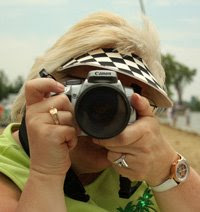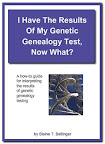Trace Your Roots With DNA by Megan Smolenyak Smolenyak is a nice book for an overview of the field of genetic genealogy testing. It goes into detail describing the process of DNA testing and discusses what you can expect to learn from Y-DNA and mtDNA testing. Beyond that, Megan has a nice section on starting a group project and has information about where you can locate others in your same haplogroup or surname. Lots of good information here.
My Opinion: Here's another good overview book that is successful at reducing the sci-cho babble to genealogy-speak. It's a book genealogists will be able to understand without running for the dictionary. For me the most interesting parts of her book were specific cases where DNA testing was used to validate relationships, especially with mtDNA which is typically not thought to be used as such.
What's to be learned about haplogroup H: Unfortunately, nothing.
Showing posts with label Book Reviews. Show all posts
Showing posts with label Book Reviews. Show all posts
Thursday, March 20, 2008
Wednesday, March 5, 2008
Book Review: The Seven Daughters of Eve
The first book that I read after getting my mtDNA results was The Seven Daughters of Eve by Bryan Sykes. Bryan was one of the first to look at mtDNA with the idea of learning about deep ancestry. He is a professor of Human Genetics at the Institute of Molecular Medicine at Oxford University.
The first 2/3 of this book is more or less an autobiographical look at Bryan's contribution to genetic anthropology research. As he describes it, "This book is about the history of the world as revealed by genetics." I would describe it as a book about the beginnings of the field of mtDNA anthropology research and it's application to those with deep (50,000-10,000 years ago) European ancestry.
Along with explaining to his readers what DNA is and what it can tell us, he also cites a few real life examples of how the information can be used. One such example involved the uncovering of remains thought to be those of the Romanov family, the last Tsar of Russia, Nicholas II, his wife and their children. He went through how mtDNA testing was used to confirm their identity.
In a nutshell, the seven daughters of Eve represent the "seven direct maternal ancestors of virtually all 650 million modern Europeans". Scientists have assigned a letter designation to each of these women's mtDNA groups and then Bryan gave the "clan mothers" corresponding women's names: Ursula, Xenia, Helena, Velda, Tara, Katrine, and Jasmine.
The last 1/3 of the book is historical fiction. Bryan took some factual information from what is known about the people who lived 50,000-10,000 years ago and created short stories about each of the clan mothers, illustrating what their lives might have been like.
My Opinion: This book gets high marks for readability. You don't need a background in genetics or anthropology to understand it. You'll come away with a good understanding of the field Bryan speaks of and why it isn't really "genetic genealogy" but rather "genetic anthropology". (I'm thinking the marketing geniuses at the genetic testing companies are really stretching things to tap into the huge market of genealogy and family history enthusiasts... the more relevant market for mtDNA tests (anthropologists) wouldn't be anywhere near as lucrative for them.) That said, it was very interesting reading and I would definitely recommend the book.
What's to be learned about haplogroup H: You can pick up some bits and pieces of information about haplogroup H from reading this book but you'll likely come away with more questions than answers.
Sykes, Bryan. The Seven Daughters of Eve. New York: W.W. Norton & Co., 2001.
The first 2/3 of this book is more or less an autobiographical look at Bryan's contribution to genetic anthropology research. As he describes it, "This book is about the history of the world as revealed by genetics." I would describe it as a book about the beginnings of the field of mtDNA anthropology research and it's application to those with deep (50,000-10,000 years ago) European ancestry.
Along with explaining to his readers what DNA is and what it can tell us, he also cites a few real life examples of how the information can be used. One such example involved the uncovering of remains thought to be those of the Romanov family, the last Tsar of Russia, Nicholas II, his wife and their children. He went through how mtDNA testing was used to confirm their identity.
In a nutshell, the seven daughters of Eve represent the "seven direct maternal ancestors of virtually all 650 million modern Europeans". Scientists have assigned a letter designation to each of these women's mtDNA groups and then Bryan gave the "clan mothers" corresponding women's names: Ursula, Xenia, Helena, Velda, Tara, Katrine, and Jasmine.
The last 1/3 of the book is historical fiction. Bryan took some factual information from what is known about the people who lived 50,000-10,000 years ago and created short stories about each of the clan mothers, illustrating what their lives might have been like.
My Opinion: This book gets high marks for readability. You don't need a background in genetics or anthropology to understand it. You'll come away with a good understanding of the field Bryan speaks of and why it isn't really "genetic genealogy" but rather "genetic anthropology". (I'm thinking the marketing geniuses at the genetic testing companies are really stretching things to tap into the huge market of genealogy and family history enthusiasts... the more relevant market for mtDNA tests (anthropologists) wouldn't be anywhere near as lucrative for them.) That said, it was very interesting reading and I would definitely recommend the book.
What's to be learned about haplogroup H: You can pick up some bits and pieces of information about haplogroup H from reading this book but you'll likely come away with more questions than answers.
Sykes, Bryan. The Seven Daughters of Eve. New York: W.W. Norton & Co., 2001.
Subscribe to:
Posts (Atom)


